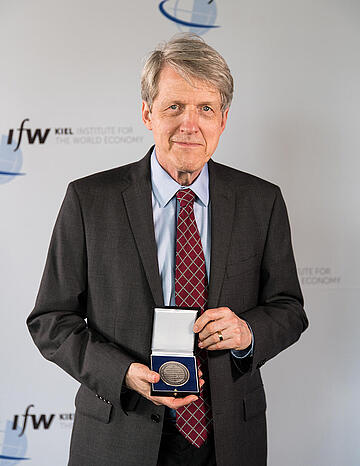Global Economy Prize Laureate 2018
Robert Shiller

Robert James Shiller was born in Detroit on March 29, 1946. His father was an engineer and entrepreneur who owned a company that manufactured industrial furnaces he had patented. Shiller is of Lithuanian descent; his maternal as well as paternal grandparents emigrated to the US independently of each other early in the 20th century and met through the Lithuanian-American community.
According to Shiller, he was hyperactive and had great difficulty concentrating in primary school. He was even at risk of failing a grade. On the other hand, even as a child he was fascinated by scientific topics, which captivated him so completely that they totally absorbed his attention. As a teenager, he happened to read the book entitled "Economics" by Paul A. Samuelson, who later won the Nobel Prize for Economics. Though his enthusiasm had previously been primarily directed at the natural sciences, Shiller became fascinated by economics because of its ability to explain many things about day-to-day life.
In 1964, Shiller began his studies in economics at the University of Michigan and, while attending a psychology lecture, recognized the important role behavioral research plays in economic matters. He graduated in 1967 but was still unclear about which career to pursue. In order to consider his options, he took long walks and, while doing so, sustained a fracture of the metatarsal bone in his foot. During treatment, a doctor told him that this type of injury is incurred chiefly by soldiers on long forced marches.
Totally by chance, as he puts it, he eventually decided to enter the Ph.D. program at the Massachusetts Institute of Technology (MIT). One of his fellow students was Mario Draghi, currently head of the European Central Bank. His teachers included Paul A. Samuelson, who played a defining role in incorporating mathematical methods into the study of economics. Shiller was fascinated by Samuelson's analytical models and the search for evidence, which up to then he had associated almost exclusively with the natural sciences. His doctoral thesis was supervised by Franco Modigliani, who is recognized for developing the Modigliani-Miller model, which deals with the relationship between a company's capital structure and financing costs. Shiller was impressed by Modigliani's efforts to explain real-life situations. Shiller received his Ph.D. in 1972.
In the years that followed, Shiller conducted research and taught in various academic positions at distinguished institutions—including the University of Minnesota, MIT, the National Bureau of Economic Research, the University of Pennsylvania, the University of Cambridge, and Harvard University—before taking on a professorship at Yale in 1982, which he continues to hold today.
Shiller increasingly came to question conventional economic models that assume rational decision-making on the part of individuals and the efficiency of markets and concentrated heavily on empirical research. In 1981, Shiller published an article in The American Economic Review, in which he argued that fluctuations in the stock market since the 1920s should not have been as great as they actually were if one assumes that investors behave rationally and markets operate efficiently.
In 1982, he became acquainted with the now famous behavioral economist Richard Thaler and together they held seminars on behavioral economics. Shiller found the opening up of economics to other social science disciplines, including psychology, biology, and neuroscience, to be liberating. The central thesis of his work—that investors often decide irrationally and on the basis of emotions—attracted increased attention following the stock market crash of 1987.
In 1991, Shiller founded Case Shiller Weiss, Inc. (CSW) together with his colleague Karl Case and former student at Yale Allan Weiss. They developed a series of price indices for housing, the Case-Shiller Index, which show trends in US real estate prices. It is now marketed by Standard & Poor's and is regarded as an important indicator for equity and commodity prices.
At the height of the “new economy” euphoria, Shiller published his book “Irrational Exuberance,” a warning that a bubble had formed on the stock market, as was soon borne out by subsequent events. Shiller also raised warnings early on about the bubble in the US real estate market, which burst in 2007, triggering panic on financial markets.
In 2013, Shiller was awarded the Nobel Memorial Prize in Economics together with Eugene Fama and Lars Peter Hansen “for their empirical analysis of asset prices.” Shiller always endeavors to find practical applications for his research. He has written numerous guest commentaries and published several books in which he explains to the general public the forces at work in the financial markets and issues calls for political reforms.
Shiller is considered an exponent of New Keynesianism and behavioral finance. Through his numerous guest commentaries, widely acclaimed books, and free webinars, Shiller invariably seeks to make his findings accessible to a wider audience, so that they may find practical application.
Robert James Shiller is married and has two children.